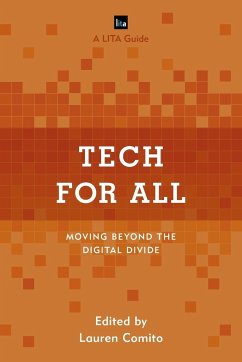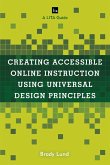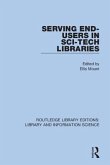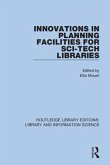Tech for All
Moving beyond the Digital Divide
Herausgeber: Comito, Lauren
Tech for All
Moving beyond the Digital Divide
Herausgeber: Comito, Lauren
- Broschiertes Buch
- Merkliste
- Auf die Merkliste
- Bewerten Bewerten
- Teilen
- Produkt teilen
- Produkterinnerung
- Produkterinnerung
This book examines how the unequal distribution of resources between communities can limit access to emerging technologies. It gives real world examples of libraries going the extra mile to bring more than just email access to their communities, regardless of economic status or geographic distribution.
Andere Kunden interessierten sich auch für
![Creating Accessible Online Instruction Using Universal Design Principles Creating Accessible Online Instruction Using Universal Design Principles]() Brady LundCreating Accessible Online Instruction Using Universal Design Principles56,99 €
Brady LundCreating Accessible Online Instruction Using Universal Design Principles56,99 €![Sci-Tech Libraries of the Future Sci-Tech Libraries of the Future]() Sci-Tech Libraries of the Future53,99 €
Sci-Tech Libraries of the Future53,99 €![Serving End-Users in Sci-Tech Libraries Serving End-Users in Sci-Tech Libraries]() Serving End-Users in Sci-Tech Libraries53,99 €
Serving End-Users in Sci-Tech Libraries53,99 €![End-User Training for Sci-Tech Databases End-User Training for Sci-Tech Databases]() End-User Training for Sci-Tech Databases47,99 €
End-User Training for Sci-Tech Databases47,99 €![Innovations in Planning Facilities for Sci-Tech Libraries Innovations in Planning Facilities for Sci-Tech Libraries]() Innovations in Planning Facilities for Sci-Tech Libraries53,99 €
Innovations in Planning Facilities for Sci-Tech Libraries53,99 €![Sci-Tech Libraries Serving Zoological Gardens Sci-Tech Libraries Serving Zoological Gardens]() Sci-Tech Libraries Serving Zoological Gardens52,99 €
Sci-Tech Libraries Serving Zoological Gardens52,99 €![One Hundred Years of Sci-Tech Libraries One Hundred Years of Sci-Tech Libraries]() One Hundred Years of Sci-Tech Libraries53,99 €
One Hundred Years of Sci-Tech Libraries53,99 €-
-
-
This book examines how the unequal distribution of resources between communities can limit access to emerging technologies. It gives real world examples of libraries going the extra mile to bring more than just email access to their communities, regardless of economic status or geographic distribution.
Hinweis: Dieser Artikel kann nur an eine deutsche Lieferadresse ausgeliefert werden.
Hinweis: Dieser Artikel kann nur an eine deutsche Lieferadresse ausgeliefert werden.
Produktdetails
- Produktdetails
- Verlag: Rowman & Littlefield Publishers
- Seitenzahl: 218
- Erscheinungstermin: 8. Februar 2019
- Englisch
- Abmessung: 229mm x 152mm x 12mm
- Gewicht: 323g
- ISBN-13: 9781538122181
- ISBN-10: 1538122189
- Artikelnr.: 53777195
- Herstellerkennzeichnung
- Libri GmbH
- Europaallee 1
- 36244 Bad Hersfeld
- gpsr@libri.de
- Verlag: Rowman & Littlefield Publishers
- Seitenzahl: 218
- Erscheinungstermin: 8. Februar 2019
- Englisch
- Abmessung: 229mm x 152mm x 12mm
- Gewicht: 323g
- ISBN-13: 9781538122181
- ISBN-10: 1538122189
- Artikelnr.: 53777195
- Herstellerkennzeichnung
- Libri GmbH
- Europaallee 1
- 36244 Bad Hersfeld
- gpsr@libri.de
Edited by Lauren Comito
Foreword Preface Acknowledgments Part 1: Identifying the problem
Introduction - Digital Equity in Libraries Lauren Comito Chapter 1: Fund
All the Things: Finding Money to Do Great Work Erica Freudenberger Part 2:
Physical Access Chapter 2: Technology on the Border: Bringing STEAM-Based
Learning and Digital Technologies to Southern Arizona Emily Scherer Chapter
3: Linux Laptops for Libraries Alex Lent Chapter 4: Shifting Focus Toward
Imminent Needs: The Importance of Flexibility in Digital Literacy Training
to Teens Within the Maker Movement Ricci Yuhico Part 3: Training Chapter 5:
Cracking the Code: The IMLS/Mozilla Web Literacy for Library Staff Project
Davis Erin Anderson Chapter 6: You Can Do I.T.: Raising Tech Confidence and
Competencies in Rural Texas Carson Block, Cindy Fisher, and Henry Stokes
Chapter 7: Experiment, Learn, Respond at the Salt Lake City Public Library:
The First Year of the Tech League Initiative Tommy Hamby, Shauna Edson, and
Elaine Stehel Part 4: Makerspaces Chapter 8: The Best Things Made in a
Makerspace, Aren't the Physical Ones Steve Teeri Chapter 9: Library
Makerspaces and Interest-Based Learning as Tools for Digital Equity Lyndsey
Runyan Chapter 10: Improving Education with Library STEM Programs and
Access to New Technologies Maria Mucino Part 5: Technology for Employment
and Business Chapter 11: Evolution of Community Services in Saint Paul
Rebecca Ryan and Pang Yang Chapter 12: Creative Opportunity for All:
Makerspaces for Youth and Adult Workforce Populations in an Urban Setting
Amanda Feist, Katrina Hartz Taylor, and Xenia Hernández Chapter 13:
Learning from Our Community - Using an Assessment Tool to Meet Patrons at
the Point of Need Amy Honisett, Gloria Jacobs, Judy Anderson, Jill Castek,
Cindy Gibbon, and Matthew Timberlake About the Editor and Contributors
Index
Introduction - Digital Equity in Libraries Lauren Comito Chapter 1: Fund
All the Things: Finding Money to Do Great Work Erica Freudenberger Part 2:
Physical Access Chapter 2: Technology on the Border: Bringing STEAM-Based
Learning and Digital Technologies to Southern Arizona Emily Scherer Chapter
3: Linux Laptops for Libraries Alex Lent Chapter 4: Shifting Focus Toward
Imminent Needs: The Importance of Flexibility in Digital Literacy Training
to Teens Within the Maker Movement Ricci Yuhico Part 3: Training Chapter 5:
Cracking the Code: The IMLS/Mozilla Web Literacy for Library Staff Project
Davis Erin Anderson Chapter 6: You Can Do I.T.: Raising Tech Confidence and
Competencies in Rural Texas Carson Block, Cindy Fisher, and Henry Stokes
Chapter 7: Experiment, Learn, Respond at the Salt Lake City Public Library:
The First Year of the Tech League Initiative Tommy Hamby, Shauna Edson, and
Elaine Stehel Part 4: Makerspaces Chapter 8: The Best Things Made in a
Makerspace, Aren't the Physical Ones Steve Teeri Chapter 9: Library
Makerspaces and Interest-Based Learning as Tools for Digital Equity Lyndsey
Runyan Chapter 10: Improving Education with Library STEM Programs and
Access to New Technologies Maria Mucino Part 5: Technology for Employment
and Business Chapter 11: Evolution of Community Services in Saint Paul
Rebecca Ryan and Pang Yang Chapter 12: Creative Opportunity for All:
Makerspaces for Youth and Adult Workforce Populations in an Urban Setting
Amanda Feist, Katrina Hartz Taylor, and Xenia Hernández Chapter 13:
Learning from Our Community - Using an Assessment Tool to Meet Patrons at
the Point of Need Amy Honisett, Gloria Jacobs, Judy Anderson, Jill Castek,
Cindy Gibbon, and Matthew Timberlake About the Editor and Contributors
Index
Foreword Preface Acknowledgments Part 1: Identifying the problem
Introduction - Digital Equity in Libraries Lauren Comito Chapter 1: Fund
All the Things: Finding Money to Do Great Work Erica Freudenberger Part 2:
Physical Access Chapter 2: Technology on the Border: Bringing STEAM-Based
Learning and Digital Technologies to Southern Arizona Emily Scherer Chapter
3: Linux Laptops for Libraries Alex Lent Chapter 4: Shifting Focus Toward
Imminent Needs: The Importance of Flexibility in Digital Literacy Training
to Teens Within the Maker Movement Ricci Yuhico Part 3: Training Chapter 5:
Cracking the Code: The IMLS/Mozilla Web Literacy for Library Staff Project
Davis Erin Anderson Chapter 6: You Can Do I.T.: Raising Tech Confidence and
Competencies in Rural Texas Carson Block, Cindy Fisher, and Henry Stokes
Chapter 7: Experiment, Learn, Respond at the Salt Lake City Public Library:
The First Year of the Tech League Initiative Tommy Hamby, Shauna Edson, and
Elaine Stehel Part 4: Makerspaces Chapter 8: The Best Things Made in a
Makerspace, Aren't the Physical Ones Steve Teeri Chapter 9: Library
Makerspaces and Interest-Based Learning as Tools for Digital Equity Lyndsey
Runyan Chapter 10: Improving Education with Library STEM Programs and
Access to New Technologies Maria Mucino Part 5: Technology for Employment
and Business Chapter 11: Evolution of Community Services in Saint Paul
Rebecca Ryan and Pang Yang Chapter 12: Creative Opportunity for All:
Makerspaces for Youth and Adult Workforce Populations in an Urban Setting
Amanda Feist, Katrina Hartz Taylor, and Xenia Hernández Chapter 13:
Learning from Our Community - Using an Assessment Tool to Meet Patrons at
the Point of Need Amy Honisett, Gloria Jacobs, Judy Anderson, Jill Castek,
Cindy Gibbon, and Matthew Timberlake About the Editor and Contributors
Index
Introduction - Digital Equity in Libraries Lauren Comito Chapter 1: Fund
All the Things: Finding Money to Do Great Work Erica Freudenberger Part 2:
Physical Access Chapter 2: Technology on the Border: Bringing STEAM-Based
Learning and Digital Technologies to Southern Arizona Emily Scherer Chapter
3: Linux Laptops for Libraries Alex Lent Chapter 4: Shifting Focus Toward
Imminent Needs: The Importance of Flexibility in Digital Literacy Training
to Teens Within the Maker Movement Ricci Yuhico Part 3: Training Chapter 5:
Cracking the Code: The IMLS/Mozilla Web Literacy for Library Staff Project
Davis Erin Anderson Chapter 6: You Can Do I.T.: Raising Tech Confidence and
Competencies in Rural Texas Carson Block, Cindy Fisher, and Henry Stokes
Chapter 7: Experiment, Learn, Respond at the Salt Lake City Public Library:
The First Year of the Tech League Initiative Tommy Hamby, Shauna Edson, and
Elaine Stehel Part 4: Makerspaces Chapter 8: The Best Things Made in a
Makerspace, Aren't the Physical Ones Steve Teeri Chapter 9: Library
Makerspaces and Interest-Based Learning as Tools for Digital Equity Lyndsey
Runyan Chapter 10: Improving Education with Library STEM Programs and
Access to New Technologies Maria Mucino Part 5: Technology for Employment
and Business Chapter 11: Evolution of Community Services in Saint Paul
Rebecca Ryan and Pang Yang Chapter 12: Creative Opportunity for All:
Makerspaces for Youth and Adult Workforce Populations in an Urban Setting
Amanda Feist, Katrina Hartz Taylor, and Xenia Hernández Chapter 13:
Learning from Our Community - Using an Assessment Tool to Meet Patrons at
the Point of Need Amy Honisett, Gloria Jacobs, Judy Anderson, Jill Castek,
Cindy Gibbon, and Matthew Timberlake About the Editor and Contributors
Index








